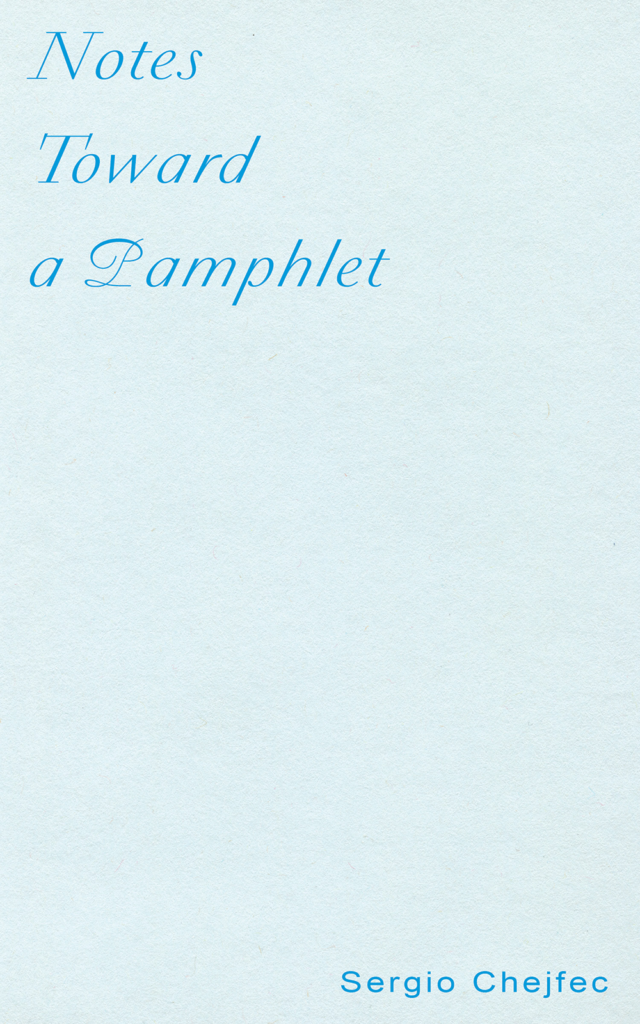It is hard to think of another contemporary writer who, marrying true intellect with simple description of a space, simultaneously covers so little and so much ground.
Times Literary Supplement

Notes Toward a Pamphlet
Sergio Chejfec
Translated by Whitney DeVos
July 2020
Argentine poet Samich moves from the provinces to the outskirts of Buenos Aires and decides to turn his life into a work of art. Fumbling through a world constructed of intuitions and beliefs, he has scant preparation and few firm ideas about how to do this. Nonetheless, he develops a cult following. Fiction writer and essayist Sergio Chejfec offers a series of numbered notes as an outline of Samich’s thinking-in-process, investigating the pamphlet form as a “megaphone” for the dissemination of “views” bound by “a situation of existence” of a poet who “aspired to a voice permanently lowered.” As if to say: by means of the pamphlet, the biography becomes the work.
This pamphlet is part of UDP’s 2020 Pamphlet Series: twenty commissioned essays on collective work, translation, performance, pedagogy, poetics, and small press publishing. The pamphlets are available for individual purchase and as a subscription. Each offers a different approach to the pamphlet as a form of working in the present, an engagement at once sustained and ephemeral. To view a full list of pamphlets, click here.
About the Author
Sergio Chejfec, originally from Argentina, has published numerous works of fiction, poetry, and essays. His novels translated into English: My Two Worlds (Open Letter); The Dark (2012, Open Letter); The Planets (Open Letter, a finalist for the 2013 Best Translated Book Award), Baroni: A Journey (Almost Island); and The Incompletes (Open Letter). Some of his short stories and essays in translation can be read at Asymptote, Words Without Borders, Music & Literature, and elsewhere. He currently teaches in the Creative Writing in Spanish Program at NYU.
Praise
To say that Notes Towards a Pamphlet reads like a condensed version of the best of Chejfec is to blatantly flout the author’s antipathy towards such categorical pronouncements. Yet here, in the space of only 45 pages, readers unfamiliar and familiar with Sergio Chejfec will find every trait that makes a work by this author so unexpectedly, maddeningly addictive. How he turns obliqueness, indirectness, and indefiniteness into a spellbinding narrative and barely etched characters into sources of fascination are mysteries to be savored rather than solved. By turns melancholy and drily comic, these “notes” can be read as an unemphatic but evocative reflection of Chejfec’s literary and philosophical journey. DeVos’s translation captures the nuances and rhythms of Chejfec’s prose remarkably well.
Dianna Niebylski
... Chefjec has written, not a pamphlet as such, but merely notes toward a pamphlet that does not exist. His straightfaced explication of this tragicomic condition 'allows Samich to be seen as a shadow in the middle of his pensive laboring, hunched over some papers spread across the bed,' with irony and sympathy.
Barry Schwabsky
Chejfec, who has published numerous works of fiction, poetry and essays, has managed to create a little gem of a book. Filled with wonderful “notes” — luminous ideas and sharp reflections — it’s a memorable pamphlet from a Latin American poet.
Morning Star
Praise for Previous Work
On first reading Chejfec, we recall many admired authors, but at a later moment—a more solid and lasting one—we realize that he resembles no one, and that he has chosen an unusual and quite distinctive path, one that reveals itself slowly because of the demanding and very personal searches the author himself carries out in his narrative.
Enrique Vila-Matas
About the Translator
Whitney DeVos is a writer, translator, and scholar specializing in literatures and cultures of the Americas. She is the translator of Notes Toward a Pamphlet by Sergio Chejfec (Ugly Duckling) and The Semblable by Chantal Maillard (Ugly Duckling), as well as co-translator of Carlos Soto Román’s 11 (Ugly Duckling) and Hugo García Manríquez’s Commonplace / Lo común (Cardboard House). Involved in various collaborative editorial endeavors, most recently she co-edited Ruge el bosque: ecopoesía del cono sur (Caleta Olivia), the first volume in a series of multilingual ecopoetry anthologies aimed at a global hispanophone audience. Currently a National Endowment for the Arts translation fellow, she lives and works in Mexico City.
In the News
Links
Publication Details
ISBN: 978-1-946433-56-5
Pamphlet
Staple-bound. 48 pp, 5 x 8 in
Publication Date: July 01 2020
Distribution: Asterism Books (US), Inpress Books (UK)
Series: 2020 Pamphlet Series